人教新目标八年级英语上册Unit1 What did you do on vacation 课件 (共23张PPT)
人教新目标英语八年级上册Unit1- 2单词总结归纳
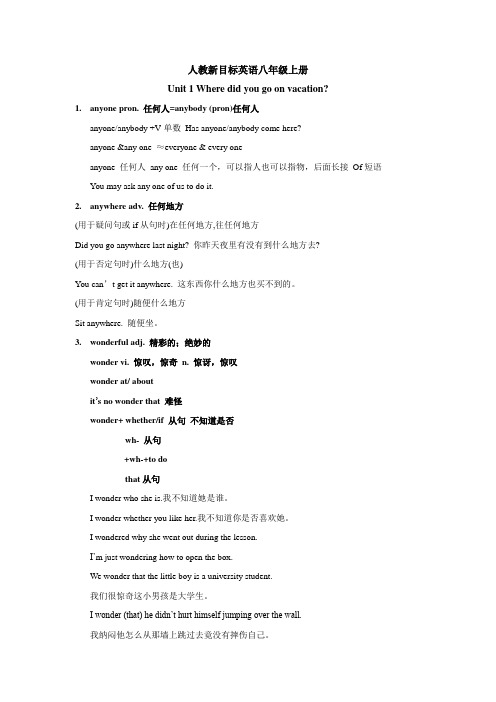
人教新目标英语八年级上册Unit 1 Where did you go on vacation?1.anyone pron. 任何人=anybody (pron)任何人anyone/anybody +V单数Has anyone/anybody come here?anyone &any one ≈everyone & every oneanyone 任何人any one 任何一个,可以指人也可以指物,后面长接Of短语You may ask any one of us to do it.2.anywhere adv. 任何地方(用于疑问句或if从句时)在任何地方,往任何地方Did you go anywhere last night? 你昨天夜里有没有到什么地方去?(用于否定句时)什么地方(也)You can’t get it anywhere. 这东西你什么地方也买不到的。
(用于肯定句时)随便什么地方Sit anywhere. 随便坐。
3.wonderful adj. 精彩的;绝妙的wonder vi. 惊叹,惊奇n. 惊讶,惊叹wonder at/ aboutit’s no wonder that 难怪wonder+ whether/if 从句不知道是否wh- 从句+wh-+to dothat从句I wonder who she is.我不知道她是谁。
I wonder whether you like her.我不知道你是否喜欢她。
I wondered why she went out during the lesson.I’m just wondering how to open the box.We wonder that the little boy is a university student.我们很惊奇这小男孩是大学生。
I wonder (that) he didn’t hurt himself jumping over the wall.我纳闷他怎么从那墙上跳过去竟没有摔伤自己。
人教版新目标八年级上册英语全册1-10单元重点短语词组总结汇编

人教版新目标八年级上册英语1-10单元重点短语词组总结汇编Unit1 Where did you go on vacation?(1)decide to go(to someplace) 决定去(某地)decide to do something 决定做某事make a decision 做决定,下决心(2)have a good time 玩得愉快have a wonderful time 玩得开心/痛快(=have fun/enjoy oneself)(3)the top of the mountain 山顶(4)stay at home 待在家里(5)go to the mountains 去山里go to the beach 去海边go to summer camp 参加夏令营(6)visit my uncle 拜访我的叔叔visit museums 参观博物馆(7)feel like 感受到,给人……的感觉(8)quite a few 相当多,不少(9)of course 当然(10)because of 由于,因为(11)try to do something努力/尽力/试图做某事try doing something试着做某事have a try 尝试一下(此处try为n.)(12)dislike somebody/something 厌恶/不喜欢某人/某物(13)be/get bored with 对……厌倦(14)have a great difference in…在……方面存在很大差异make a difference 有影响,有转折,创造不同/有所成就be different from…与……不同(15)by oneself 某人独自(= on one's own)Unit2 How often do you exercise?(1)at least 至少,不少于,起码at most 至多,最多,不超过(2)such as 例如(3)more than 多于less than少于(4)use the Internet 使用网络(5)watch television/TV看电视(6)read English books 看英语书籍(7)go online 上网go shopping 去购物(8)eat vegetables and fruit 吃水果和蔬菜(9)most of the time 大部分时间(10)stay up late 熬夜, 晚睡(=burn the midnight oil)(11)healthy habits健康的习惯(12)Old habits die hard旧习难改(13)do housework 做家务help with housework 帮忙做家务do homework 做家庭作业(14)junk food垃圾食品fast food快餐,速食instant noodles方便面instant coffee速溶咖啡(15)hardly ever 几乎从不(16)once a day一天一次once a week一周一次once a year一年一次once again再次(17)twice a day一天两次twice a week一周两次twice a year一年两次once or twice一两次,偶尔(18)be full of sth. (有)大量的,丰富的(=be filled with sth.)(19)a full bottle of wine一满瓶葡萄酒a full day of…一整天的……a full life一个经历丰富的人生the full story全部情况(20)swing dance摇摆舞(21)be good for one’s health对某人身体健康好be bad for one’s health 对某人身体健康有害(22)keep healthy 保持健康stay healthy 保持健康healthy lifestyle健康的生活方式healthy food有益健康的食物(23)one/a hundred percent百分百one percent 百分之一fifty percent百分之五十one percent of students…百分之一的学生……how many percent of the students…? 百分之几/多少的学生……?(24)常见的频度副词排序(程度从高到底)如下:always 总是100%almost always 几乎总是90%usually 通常80%often 经常60%sometimes 有时40%seldom 很少20%hardly ever 几乎不曾5%almost never 几乎从不 2%never 从不0%(25)how often…? 问频率,意为“多久一次”how soon…? 问将来,意为“多久以后”how long…? 问时间段,意为“多久”,“多长时间”(26)sometimes是副词,意为“有时”,常用于一般现在时,表示频率some times意为“几次;几倍”sometime意为“某时”,可用于过去时或将来时some time意为“一段时间”(27)be good for对……有益be good at 擅长……be good to 对……友善Unit3 I’m more outgoing than my sister.(1)care about 关心,在意care for 关心,照顾,喜欢(2)be different from 与……不同/有差异(3)bring out 使呈现,使表现出(4)the same as 和……相同/一致(5)in fact 事实上,实际上(6)be similar to 与……相似的(7)primary school 小学(8)be talented in在……方面有天赋(9)do the same things 做同样的事情(10)be good at sports 擅长运动(11)make sb. laugh让某人笑laugh at sb.嘲笑/取笑某人laugh with sb.与某人同声笑laugh loudly 大声笑(12)be quiet/keep quiet 保持安静(13)win a competition赢得一场比赛competition and cooperation 竞争与合作(14)true or false 是非,正误(15)be serious about 对……是认真的take it seriously 认真对待(16)It is (not)necessary to do sth. (没)有必要做某事(17)touch my heart触动我的心灵in touch with 和……有接触/有联系get in touch 取得联系keep in touch with 与……保持联系(18)break one’s arm摔断了胳膊break the rule违反规则(19)share…with sb.与某人分享某物lion’s share 最大的份额(20)collect information 收集信息get information 得到信息receive information 收到信息provide information提供信息a piece of information 一条消息(21)“the+比较级,the+比较级”表示“越……,就越……”The more, the better. 越多越好Unit4 What’s the best movie theater?(1)(be) close to 离……近(=next to)close friends 密友(=bosom friends知心朋友)a close game势均力敌的比赛(2)big screens 大屏幕(3)think about/ of 思考,考虑(4)do a survey of 做……的调查(5)as for 至于(6)win the prize for 获得……奖(7)the worst service 最差的服务(8)the cheapest price 最便宜的价格(9)in the south of China 在中国南部(10)talent show 才艺表演(11)have ...in common 有相同特征(12)all kinds of 各种各样的(13)be up to 是……的职责(14)play a role in…在……中发挥作用(=play a part in…)(15)make up 编造,化妆,组成(16)for example 例如(17)唱快歌sing fast songs(18)take ...seriously 认真对待……(19)come true 实现(20)be careful of 当心,小心(21)look for 寻找(强调动作)find 找到(强调结果)(22)act as 作为,担当,充当(23)How do/does sb. like ...? 意为“某人认为……怎么样?”(=“What do/does sb. think of...?”或“What do/does sb. think about ...?”)(24)so far 到目前为止,迄今为止(= till now)Unit5 Do you want to watch a game show?(1)action movie 动作片(2)find out 查明,弄清(3)take sb’s place 代替,替换(=take the place of sb.)(4)be ready to do sth. 愿意做某事get ready for 为……做准备,强调动作be ready for 为……做好了准备,强调状态get sth. ready 把某物准备好(5)do a good job干得好(6)dress up 装扮,乔装打扮dress up (in) 穿上……盛装,用……装饰dress up as sb/sth. 装扮成某人或某物(7)talk show 脱口秀(8)talent show 才艺表演(9)can’t stand 受不了,不能忍受(10)soap opera肥皂剧(11)plan to do sth. 计划去做某事make a plan/plans 制定计划(12)sth.+happens/happened +to+sb. 某人发生某事sb. Happens/happened to do sth. 某人碰巧做某事(13)happen 偶然发生(无被动形式)take place 有计划发生(无被动形式)(14)expect (sb.) to do sth. 期望(某人)去做某事be expected to do sth. 被期望去做某事(15)be famous for... 因......而著名be famous as... 作为......而出名(16)good luck to sb. 祝某人好运bad luck 倒霉,坏运气(17)stand against 反对stand for 代表,表示stand out 突出;显著(18)appear to do sth. 似乎在做某事(19)succeed in doing sth. 成功做某事(be successful in doing sth.)(20)common names 常见的名字common mistakes 常犯的错误common sense 常识common interest 共同的兴趣common language 共同语言common market共同市场(21)an ordinary worker 一个普通工人ordinary-looking 相貌平常的(22)normal temperature 正常体温normal state 正常状态(24)hope for sth. 希望得到某物hope to do sth. 希望做某事(25)wish sb. sth. 希望某人有某物wish to do sth. 希望做某事wish sb. to do sth. 希望某人做某事(hope没有这种用法)Unit6 I’m going to study computer science(1)write down 写下,记下(2)have to do with 关于,与……有关系have nothing to do with…与……无关(3)take up 学着做,开始做;占据,占用(4)agree with 同意,赞成(后面接表示人或表示“意见,观点”的词)agree to 赞同,同意(后面接表示计划,提议,办法,安排等词,to是介词)(5)personal improvement 自我改进(6)make promises 许诺give a promise 许下诺言keep a promise 信守诺言(=keep one’s word)carry out a promise 履行诺言break a promise 违背诺言promise to do sth. 答应/许诺做某事(7)have something in common 有共同点(8)improve relationships 改善关系(9)at the beginning 在……开始(10)for this reason因为这个原因(11)send for 派人去叫send away 派遣,解雇send off 送别,差遣send up 发射(12)make a resolution做决定,下决心(13)make sure(of)确信(=be sure)(14)discuss sth. with sb. 和某人谈论某事(15)grow up 成长,长大grow into 长大成为(16)be going to do sth. 打算,准备,计划做某事(将来时)(17)make a plan for…为……制定计划(18)a kind of 一种all kinds of 各种各样的kind of 有点(= a little)Unit7 Will people have robots? (1)space station太空站(2)over and over again 多次,反复地(3)hundreds of 数以百计,许多,大量(4)be able to do sth. 能够做某事be unable to do sth. 不能做某事(5)fall down 倒下,跌倒,倒塌fall asleep入睡fall behind落后于(某人或某物)fall in love with喜爱,爱上fall off 掉下fall over 跌落,被绊倒fall into落入,陷入A fall into the pit, a gain in the wit. 吃一堑,长一智(此处fall为n. 跌落)(6)look for寻找(强调动作)(7)play a part in sth.参与某事(= play a role in sth.)play a part in doing sth. 参与做某事(8)in 100 years 一百年以后(9)help with the housework帮忙做家务(10)seem impossible好像不可能(11)make robots look like humans使机器人看起来和人类一样(12)for example例如(13)have many different shapes有很多不同的外形(14)air/water pollution 空气/水污染noise pollution 噪音污染environmental pollution “环境污染(15)believe sb. 相信某人说的话believe in sb. 信任某人,相信某人的人格(16)be free to do sth. 自由地做某事(17)try sth. 尝试某事try to do sth. 尽力做某事try doing sth. 试着做某事try one’s best to do sth. 尽某人最大努力做某事(= do one’s best to do sth.)try on试穿try out 试用,试验have a try 试一试(18)look like看起来像……(应用范围最广,除了描述人、物之外,也能抽象表达事件或现象)take after像……,与……相似(最常见的是用在有血缘关系的亲子之间,外貌用的最多,也能够用在性格脾气这些内在特质上)be similar to 与……相似(一般用在相近似的物品和情境的对比上)Unit8 How do you make a banana milk shake?(1)p our…into …把……倒进……里(通常强调倾倒液体)put…into…把……放进……里(既可以放液体,也可以放固体)pour out 倒出(2)t urn on 接通,打开(电源开关)turn off 关闭,熄灭(灯、煤气等)turn up (把音量)调大,调高turn down (把音量)调小,调低turn in 上交turn into使成为;翻译成turn to转向turn over翻转(3)cut up 切碎(4)mix up混合在一起(5)peel the bananas 剥香蕉(6)a cup of yogurt 一杯酸奶(7)five spoons of honey 五勺蜂蜜(8)add…to…把……加到……add to增加;增添(其中to是介词,后接名词或代词)add up 把……加起来add up to 总计,加起来结果是(9)celebrate with 用......庆祝(10)a piece of art一件艺术品a piece of一张,一片,一件,一条in pieces 碎片,碎块(11)cover…with…用......覆盖be covered with 被……覆盖(12)at first 起初,首先from first to last自始至终first of all 首先,第一(13)be filled with 充满......(= be full of)(14)put away把……收起来放好put on穿上put off推迟,延期put out熄灭put down放下put up建造;挂起;举起put…on…把……放在……上put together 放在一起(15)sth. needs doing 某物/事需要被做=sth. needs to be done(16)have a big meal 吃大餐(17)it’s time to do sth 到/是做某事的时候了(=it’s time for doing sth/ sth)(18)make sb. sth. = make sth. for sb. 为某人做某物Unit9 Can you come to my party?(1)prepare sth. 准备......prepare to do sth. 准备做某事prepare for an exam 为考试做准备prepare for (doing)sth. 为某事做准备prepare sth. for... 为……准备某物make preparations for 做准备(2)hang out闲逛,徘徊,逗留(=hang about)hang up挂断(电话)hang on不挂断(3)take a trip 去旅行(4)reply to(sb./sth.) 对......作出回答或答复reply for 致答辞;谢辞a reply to... 对......的答复in reply (to) 作为(对……的) 答复,为答复……(5)hear from sb. 收到某人来信(6)the day after tomorrow后天(7)another time 别的时间(8)look forward to 盼望,期待(9)turn down 拒绝(10)the day before yesterday前天(11)have the flu 患流感(12)go to the doctor 看医生(13)come to the party来参加聚会(14)meet friends见朋友(16)have to 不得不(16)invite sb to do 邀请某人做某事invite sb to someplace 邀某人去某地invite sb. for a drink 请某人喝酒(17)refuse sb. 拒绝某人refuse (sb.) to do 拒绝某人去做某事refuse sb. sth.为某事拒绝某人(作为及物动词)(18)catch one's breath 喘气,吓一跳,(由惊吓)暂时停止呼吸catch out 发觉某人的过失/错误,找破绽catch up with赶上(19)to one’s surprise 使某人吃惊的是……in surprise 吃惊地be surprised at/about 对……感到吃惊/意外(20)too much强调much,修饰不可数名词much too强调too,修饰形容词或副词(21)thanks for…为……而感谢,后接名词、代词或动名词thanks to 幸亏,由于thank sb. for sth. 为某事感谢某人be thankful to sb. for sth. 因某事而对某人心存感激(22)be busy doing sth. 忙于做某事be busy with sth. 忙于……(23)call sb. 给某人打电话(=ring sb.phone sb.ring sb. upgive sb. a callgive sb. a ringmake a phone call to sb.)(24)look forward to期待,盼望(to是介词,后面接名词,代词或动名词作宾语)(25)not…until…直到……才(26)have to 客观上不得不must主观上必须(27)can’t help doing sth 禁不住做某事help oneself to 随便用……with the help of =with one’s help在……的帮助下help sb. out 帮助某人摆脱困境help sb.(to)do sth. 帮助某人做某事Unit10 If you go to the party, you’ll have a great time! (1)keep…to oneself保守秘密;不与人来往,不交际keep doing sth. 继续做某事,保持某种状态(2)in the end/at last 最后,终于(3)make a mistake/make mistakes 犯错误by mistake错误地(不是故意做某事)(4)too…to…太……而不能……(5)advise sb. (not)to do sth. 建议某人(不)做某事(6)be angry with sb. 生某人的气be / get angry at / about sth. 因某事而生气(7)cut...in half 把……切成两半/一切为二be halfway to …完成了或做了事情的一部分(此处to是介词)(8)have lots of worries 有很多烦恼(9)the first step to do sth. 做某事的第一步(10)ask for advice 寻求建议a piece of advice一条建议give sb. advice (on) 给……提(有关……)的建议take one’s advice 听从某人的建议(11)have problems with…在……某方面有问题(12)run away from 逃离(13)solve (=deal with)problems 解决问题(14)go to the party 参加聚会go fishing 去钓鱼(15)be upset with sb. 生某人的气upset oneself 使某人自己心烦气乱(16)do enough exercise 做足够的运动(17)cook/make dinner/supper 做晚饭(18)have lots of money 有很多钱(19)eat too much 吃得太多(20)help others 帮助别人(21)a great soccer player 一个伟大的足球运动员(22)travel around the world 周游世界(23)have / be an experience有/是一次经历be experienced in 在……方面有经验have no experience at all 完全没有经验rich experience 丰富的经验practical experience 实务经验,实践经验(24)in the end 最后,终于(=at last,finally)by the end of到……为止,在……以前at the end of在……末尾,在……尽头(25)be afraid of/to do sth. 害怕做某事,不敢做某事(此外be afraid of还可以表示担心可能会发生某事)(26)worry about /over sth/sb担心某事/某人worry about=be worried about 担心(27)ask sb. to do sth. 请求/要求某人做某事其否定形式为ask sb. not to do sth.第21 页共21 页。
八年级英语上册Unit1Wheredidyougoonvacation课件新版人教新目标版
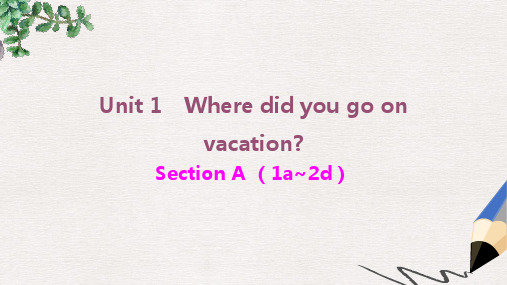
回我说过的话。
Take off your wet clothes. 脱下你的湿衣服。
【应用】
( C )1. Can I _____ of flowers? A. take off
B. take on
C. take photos
D. take back
要点梳理
( B )2. When I arrived at the airport, I saw my plane just _____. What a pity! A. take away B. take off C. took away D. took off 4 most的用法 【教材例句】I just stayed at home most of the time to read and relax. 我大部分时间只是待在家里看书和 放松。(教材第2页)
Unit 1 Where did you go on
vacation?
Section A (1a~2d)
课前导学
核心单词 1. _a_n_y_o_n_e__ pron. 任何人 2. __a_n_y_w_h_e_r_e___ adv. 在任何地方 3. __w__o_n_d_e_r_fu_l__ adj. 精彩的;绝妙的 4. ____f_e_w____ adj. & pron. 不多;很少 5. ___m__o_s_t __ adj., adv. & pron. 最多;大多数 6. __s_o_m__e_th_i_n_g__ pron. 某事;某物 7. __e_v_e_ry_o_n_e__ pron. 每人;人人;所有人
课前导学
3. We took quite a few photos there. _我__们__在__那_儿__拍__了__不__少_照__片__。______________________ 4. What about you? Did you do anything special last month? _你__呢_?__上__个__月__你_做__了__什__么__特_别__的__事__情__吗_?____________ 5. I just stayed at home most of the time to read and relax. _我__大_部__分__时__间__只_是__待__在__家__里_看__书__和__放__松_。____________
人教新目标英语八年级上册Unit1-3重点词组句子及语法
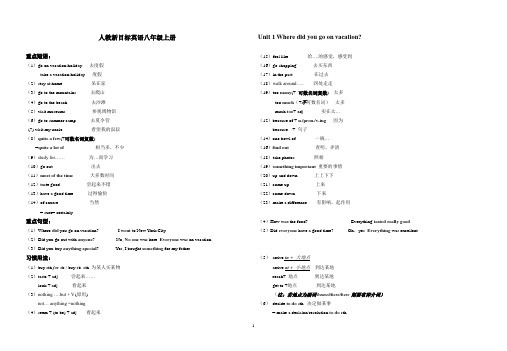
人教新目标英语八年级上册Unit 1 Where did you go on vacation?重点短语:(1)go on vacation/holiday 去度假take a vacation/holiday 度假(2)stay at home 呆在家(3)go to the mountains 去爬山(4)go to the beach去沙滩(5)visit museums 参观博物馆(6)go to summer camp 去夏令营(7) visit my uncle 看望我的叔叔(8)quite a few(+可数名词复数)=quite a lot of 相当多,不少(9)study for……为…而学习(10)go out 出去(11)most of the time 大多数时间(12)taste good 尝起来不错(13)have a good time过得愉快(14)of course 当然= sure= certainly (15)feel like 给….的感觉,感受到(16)go shopping 去买东西(17)in the past 在过去(18)walk around…..四处走走(19)too many(+ 可数名词复数) 太多too much(+不可数名词)太多much too+ adj. 实在太…(12)because of + n./pron./v-ing 因为because + 句子(14)one bowl of 一碗…(16)find out 查明,弄清(18)take photos 照相(19)something important重要的事情(20)up and down 上上下下(21)come up 上来(22)come down 下来(23)make a difference 有影响,起作用重点句型:(1)Where did you go on vacation? I went to New York City.(2)Did you go out with anyone? No, No one was here. Everyone was on vacation. (3)Did you buy anything special? Yes, I bought something for my father. (4)How was the food? Everything tasted really good. (5)Did everyone have a good time? Oh,yes. Everything was excellent.习惯用法:(1)buy sth for sb./ buy sb. sth 为某人买某物(2)taste + adj. 尝起来……look + adj 看起来(3)nothing ….but + V.(原形)not… anything =nothing(4)seem + (to be) + adj 看起来(5)arrive in + 大地点arrive at + 小地点到达某地reach+ 地点到达某地get to +地点到达某地(注:若地点为副词home/there/here则要省掉介词)(6)decide to do sth. 决定做某事= make a decision/resolution to do sth.(7) try doing sth. 尝试做某事try t o do sth. 尽力/努力/设法做某事 try one’s bes t to do sth 尽力做某事 try 过去式:tried, 三单:tries (8)enjoy doing sth . 喜欢做某事 enjoy oneself 玩得开心 (9)want to do sth . 想去做某事 (10)start / begin doing sth. 开始做某事 start / begin to do sth. 开始做某事 (11)stop doing sth. 停止正在做的某事 stop to do sth 停下来做(另一件)某事 (12)dislike doing sth. 不喜欢做某事dislike to do sth . 不喜欢做某事 (13)Why not do sth. 为什么不做…….呢? =Why don’t you do sth.(14)so + adj + that + 从句 如此…以至于 (15)tell sb. (not) to do sth.告诉某人(不要)做某事(16)keep doing sth. 一直做某事Keep on doing sth. 坚持/继续做某事 (17)forget to do sth . 忘记去做某事forget doing sth 忘记做过某事 (remember 记得, 用法一样) 语法点:1.seem 的用法(1)seem + 形容词 看起来….. You seem happy today.(2)seem + to do sth . 似乎、好像做某事 I seem to have a cold No one seemed to be bored.(3)It seems / seemed that+ 句子 看起来好像…;似乎…. It seems that no one believes you. 2. decide to do sth .决定做某事 We decided to go to the beach.. decide + 疑问词 + 动词不定式 He can not decide when to start . 3. over 介词,多于,超过,在…以上(表示数目、程度)= more than My father is over 40 years old. We waited over an hour for the train. 4. because of 因为,由于,后接名词、代词或动名词,不能接句子。
人教版新目标八年级上册UNIT1.Where_did_you_go_on_vacation?Section_A_1

4. I just stayed at home most of the time to read and relax. most意为“大多数”,后跟可数名词或不 可数名词均可。例如: Most students go to school on foot. 大多数学生步行去上学。
【辨析】 most + 名词 泛指多数,无范围; most + of + the (this/that/those/these等)名 词 ,指某一范围内的多数。 例如: Most of the students go to school by bike. 这些学生们中的多数骑自行车去上学。
1. Did you buy anything special? 在英语中,anything, something, nothing和 everything是用于指代事物的复合不定代词,与 之相对应的复合不定代词anyone, someone, no one 和everyone (anybody, somebody, nobody和 everybody) 用于指人。与形容词连用时,形容词 必须置于复合不定词之后,语法上称作“后置”。 例如:I can see someone new in your group. There’s nothing interesting in the news today.
Yes, I ...
Read the conversation 2d and match the people with the right place.
Rick
Helen
Role-play the conversation.
Rick: Hi, Helen. Long time no see. Helen: Hi, Rick. Yes, I was on vacation last month. Rick: Oh, did you go anywhere interesting? Helen: Yes, I went to Guizhou with my family. Rick: Wow! Did you see Huangguoshu Waterfall?
人教版八年级英语上册Unit1 Grammar -3c
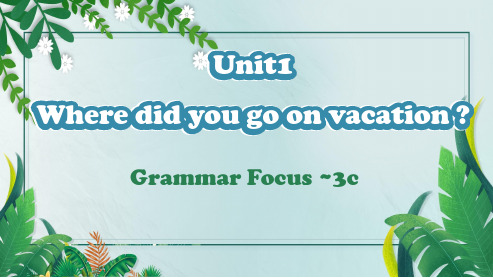
1.arrive__a_rr_iv_e_d_ 3.stop _st_o_p_p_e_d_ 6.watch w__a_tc_h_e_d_ 9.plan _p_la_n_n_e_d_ 12.shop _s_h_o_p_p_e_d
【解析】 考查动词的时态。由交际情景可知,他通过电子邮件告诉了 “我”,应用一般过去时。
动词过去式规则变化 直 一般情况下,直接在动词末尾+ed 去 以e结尾的动词,去e + ed(直接+d) 双 以重读闭音节结尾的动词,末尾只有一个辅音字母,双写
末尾辅音字母,再+ed
改 以辅音字母+y结尾的动词,改y为i,再+ed
3 用法 1. 表示过去某个时间发生的动作或存在的状态。 2. 表示过去经常或反复发生的动作。
句式
含实义动词的句式结构
例句
肯定句 主语+动词过去式+其他.
他She w爬ent to山mou了ntains。.
否定句
主+didn’t(did not)+动词原形+ 其他.
我We们di没dn’有t ge捉t a到ny 鱼fish。.
Unit1 Where did you go on vacation ?
Grammar Focus ~3c
01
This summer vacation… I….
321557098531 AJSuuelpg.t..
What did you do on summer vacation ?
did / took a PCR test went shopping
2 1
3 did nothing
played basketball 4
人教新目标八年级英语上册重难点知识点归纳

PEP八年级英语上册Unit 1 Where did you go on vacation?难点:不定代词anyone, something, anything, everything, nothing 等的用法;反身代词的用法知识点&考点:go on vacation/be on vacation 去度假stay at home 待在家里go out 出去go with 和……一起去……Long time no see. 好久不见。
take photos 照相quite a few 相当多most of time 大部分时间介词to表目的的用法buy sth. for sb. = buy sb. sth. 买……给……taste good 尝起来不错(感官动词+adjective)How do you like it = What do you think of it 你觉得……怎么样?have a good time = have fun = enjoy oneself玩得开心of course 当然nothing … but …除了……之外没有什么(not … but …)The only problem was that …(同位语从句)seem to be/seem + adj. 看起来……keep a diary 记日记+ at + 小地点arrive+ in + 大地点decide to do 决定做某事try doing sth. 尝试做某事 try to do sth. 尽力做某事feel like 感觉到 feel like + n./ v-ing想要……ride … to …骑……到……许多的:a lot of + 可数名词 lots of + 可数or不可数名词I wonder that …我想知道……in the past 在过去enjoy doing sth. 享受做某事walk around 到处逛逛感叹句:What + 冠词 + adj. + n. + (it is) = How + adj. + 冠词 + n. + (it is)start doing sth. 开始做某事 stop doing sth. 停止做某事 finish doing sth. 结束做某事because & so(不可同用)wait for …等待……because of + n.a little/ a few 一些(两者的区别,以及与little/few 的区别)enough + n. / adj. + enoughas + adj./adv. + as 和……一样……one bowl of …一碗……along the way 沿着这条路时间段+ later = after + 时间段……之后other, others, the other, the others, anotheron trip 在旅途中find out 找到,找出 / find 寻找 / look for 寻找so + adj. + that + 从句如此……以致……tell sb. (not) to do sth. 告诉某人(不要)做某事keep doing sth. / go on doing sth. 继续做某事keep sth. + adj. 使……保持……状态up and down (人)来来往往;(物)上上下下in excitement = excitedly 兴奋地come up / come out / come on / come inforget to do sth. 忘记做某事 forget doing sth. 忘记做过某事like / dislike + n. / v-ing喜欢/不喜欢某物/做某事something + adj. ……的事情Why not + v. = Why don’t you + v. 为什么不……呢?Unit 2 How often do you exercise?重点:1. How often 句型的运用;2. 六个频度副词never, hardly ever, sometimes, often, usually, always的差异、理解及使用;3. 频率数词once, twice等的认识和运用;4. 一般现在时不同人称谓语形式的变化及一般疑问句的问答。
新目标八年级英语上册全册教案
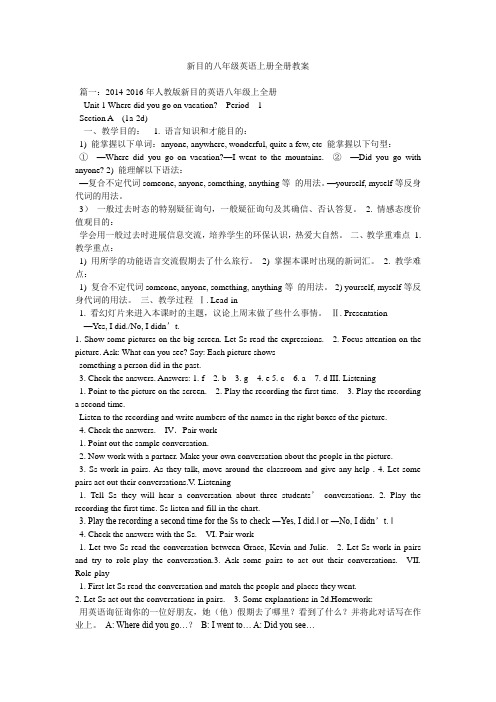
新目的八年级英语上册全册教案篇一:2014-2016年人教版新目的英语八年级上全册Unit 1 Where did you go on vacation? Period 1Section A (1a-2d)一、教学目的: 1. 语言知识和才能目的:1) 能掌握以下单词:anyone, anywhere, wonderful, quite a few, etc 能掌握以下句型:①—Where did you go on vacation?—I went to the mountains. ②—Did you go with anyone? 2) 能理解以下语法:—复合不定代词someone, anyone, something, anything等的用法。
—yourself, myself等反身代词的用法。
3)一般过去时态的特别疑征询句,一般疑征询句及其确信、否认答复。
2. 情感态度价值观目的:学会用一般过去时进展信息交流,培养学生的环保认识,热爱大自然。
二、教学重难点1. 教学重点:1) 用所学的功能语言交流假期去了什么旅行。
2) 掌握本课时出现的新词汇。
2. 教学难点:1) 复合不定代词someone, anyone, something, anything等的用法。
2) yourself, myself等反身代词的用法。
三、教学过程Ⅰ. Lead-in1. 看幻灯片来进入本课时的主题,议论上周末做了些什么事情。
Ⅱ. Presentation —Yes, I did./No, I didn’t.1. Show some pictures on the big screen. Let Ss read the expressions.2. Focus attention on the picture. Ask: What can you see? Say: Each picture showssomething a person did in the past.3. Check the answers. Answers: 1. f 2. b 3. g4. e5. c6. a7. d III. Listening1. Point to the picture on the screen.2. Play the recording the first time.3. Play the recordinga second time.Listen to the recording and write numbers of the names in the right boxes of the picture.4. Check the answers. IV.Pair work1. Point out the sample conversation.2. Now work with a partner. Make your own conversation about the people in the picture.3. Ss work in pairs. As they talk, move around the classroom and give any help .4. Let some pairs act out their conversations.V. Listening1. Tell Ss they will hear a conversation about three students’conversations.2. Play the recording the first time. Ss listen and fill in the chart.3. Play the recording a second time for the Ss to check ―Yes, I did.‖ or ―No, I didn’t. ‖4. Check the answers with the Ss. VI. Pair work1. Let two Ss read the conversation between Grace, Kevin and Julie.2. Let Ss work in pairs and try to role-play the conversation.3. Ask some pairs to act out their conversations. VII. Role-play1. First let Ss read the conversation and match the people and places they went.2. Let Ss act out the conversations in pairs.3. Some explanations in 2d.Homework:用英语询征询你的一位好朋友,她(他)假期去了哪里?看到了什么?并将此对话写在作业上。
人教新目标八年级英语上册Unit1Wheredidyougoonvacation知识点讲解
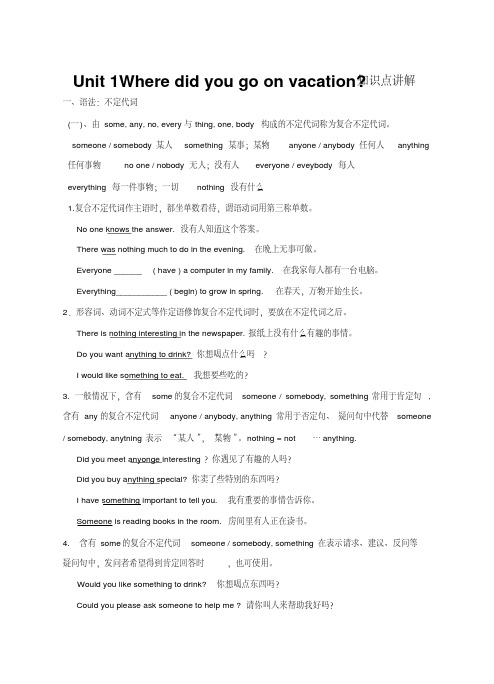
Unit 1Where did you go on vacation?知识点讲解一、语法:不定代词(一)、由some, any, no, every与thing, one, body 构成的不定代词称为复合不定代词。
someone / somebody 某人something 某事;某物anyone / anybody 任何人anything 任何事物no one / nobody 无人;没有人everyone / eveybody 每人everything 每一件事物;一切nothing 没有什么1.复合不定代词作主语时,都坐单数看待,谓语动词用第三称单数。
No one knows the answer. 没有人知道这个答案。
There was nothing much to do in the evening. 在晚上无事可做。
Everyone ______ ( have ) a computer in my family. 在我家每人都有一台电脑。
Everything___________ ( begin) to grow in spring. 在春天,万物开始生长。
2.形容词、动词不定式等作定语修饰复合不定代词时,要放在不定代词之后。
There is nothing interesting in the newspaper.报纸上没有什么有趣的事情。
Do you want anything to drink?你想喝点什么吗?I would like something to eat. 我想要些吃的?3. 一般情况下,含有some的复合不定代词someone / somebody, something常用于肯定句,含有any的复合不定代词anyone / anybody, anything常用于否定句、疑问句中代替someone / somebody, anytning表示“ 某人”,“某物”。
(人教版新目标)八年级英语上册全册各单元知识点期末总复习讲解教学课件

3. feel like “感受到;摸起来”,后跟宾语 从句或名词。 I felt like I was a bird. 我感觉我是一只鸟。 It feels like a stone. 它摸起来像一块石头。
eg.something special; somewhere wonderful. 2.不定代词做主语时,谓语动词用第三人称单数。 eg.Is everybody here? 大家都到齐了吗?
1. get to/reach/arrive 都是“到达“的意思。
get to+sp=reach+sp = arrive at+sp(小)=arrive in+sp(大) 若他们后面要加地点副词here, there, home等,则 不需要加介词。
25、up and down上上下下 26、come up出来 27、enjoy oneself=have fun=have a good time
玩的开心
二、重要句子(语法):
1.Where did you go on vacation? 你到哪里去度假了?
I went to New York City. 我去了纽约城。
三、习惯用法、搭配
1. buy sth. for ab./ buy sb. sth. 为某人买某物 2. taste + adj. 尝起来…… 3. nothing to do but do除了……之外无事可干 4. seem + (to be) + adj 看起来 5. arrive in + 大地方 / arrive at + 小地方 到达某地 6. decide to do sth=make a decision决定做某事 7. try doing sth. 尝试做某事
人教新目标英语八年级上册unit1语法总结 单元测试题(无答案)
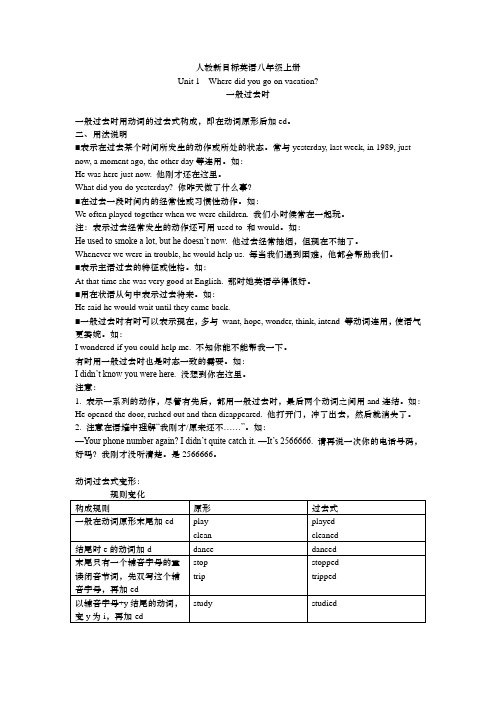
人教新目标英语八年级上册Unit 1 Where did you go on vacation?一般过去时一般过去时用动词的过去式构成,即在动词原形后加ed。
二、用法说明■表示在过去某个时间所发生的动作或所处的状态。
常与yesterday, last week, in 1989, just now, a moment ago, the other day等连用。
如:He was here just now. 他刚才还在这里。
What did you do yesterday? 你昨天做了什么事?■在过去一段时间内的经常性或习惯性动作。
如:We often played together when we were children. 我们小时候常在一起玩。
注:表示过去经常发生的动作还可用used to 和would。
如:He used to smoke a lot, but he doesn’t now. 他过去经常抽烟,但现在不抽了。
Whenever we were in trouble, he would help us. 每当我们遇到困难,他都会帮助我们。
■表示主语过去的特征或性格。
如:At that time she was very good at English. 那时她英语学得很好。
■用在状语从句中表示过去将来。
如:He said he would wait until they came back.■一般过去时有时可以表示现在,多与want, hope, wonder, think, intend 等动词连用,使语气更委婉。
如:I wondered if you could help me. 不知你能不能帮我一下。
有时用一般过去时也是时态一致的需要。
如:I didn’t know you were here. 没想到你在这里。
注意:1. 表示一系列的动作,尽管有先后,都用一般过去时,最后两个动词之间用and连结。
新版新目标英语人教版八年级上册 教材目录及各单
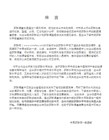
20XX年新目标英语人教版初二上册8八年级英语上册目录UNIT 1 Where did you go on vacation?Unit 2 How often do you exercise?Uuit 3 I'm more outgoing than my sister.Unit 4 What's the best movie theater?Unit 5 Do you want to watch a game show?Unit6 I'm going to study computer science.Unit 7 Will people have robots?Unit 8 How do you make a banana milk shake?Unit 9 Can you come to my party?Unit10 If you go to the party,you 'll have a great time!20XX年新目标八年级上册各单元英语单词Unit1 Where did you go on vacation? anyone ['eniwʌn] pron.任何人anywhere ['eniweə(r)] adv.任何地方n.任何(一个)地方wonderful ['wʌndəfl] adj.精彩的;极好的few [fjuː] adj.很少的;n.少量most [məʊst] adj.最多的;大多数的;something ['sʌmθɪŋ] pron.某事物;nothing(=not…anything) ['nʌθɪŋ] pron.没有什么n.没有myself [maɪ'self] pron.我自己everyone ['evriwʌn] pron.每人;人人yourself [jɔː'self] pron.你自己;你亲自hen [hen] n.母鸡;雌禽bored [bɔːd] adj.无聊的;厌烦的;郁闷的pig n.猪diary ['daɪəri] n.日记;日记簿(keep a diary)seem [siːm] vi.似乎;好像someone ['sʌmwʌn] pron.某人;有人quite a few相当多;不少(后接可数名词)of course [əvkɔːs] 当然activity [æk'tɪvəti] n.活动;活跃decide [dɪ'saɪd] v.决定;选定(decide to do sth.)try [traɪ] v.尝试;设法;努力(try to do sth. /try doing sth.) bird [bɜːd] n.鸟;禽paragliding ['pærəɡlaɪdɪŋ] n.空中滑翔跳伞bicycle ['baɪsɪkl] n.自行车building ['bɪldɪŋ] n.建筑物trader ['treɪdə(r)] n.商人;商船wonder ['wʌndə(r)] v.惊奇;想知道;怀疑difference ['dɪfrəns] n.差异;不同top [tɒp] n.顶部;顶wait [weɪt] v.等;等待(wait for)umbrella [ʌm'brelə] n.伞;雨伞wet [wet] adj.湿的;雨天的below [bɪ'ləʊ] prep.低于;在...下面adv.在下面as [əz] conj.如同;像...一样enough [ɪ'nʌf] adj.足够的adv.足够地;充分地duck [dʌk] n.鸭肉;鸭hungry(反full) ['hʌŋɡri] adj.饥饿的;渴望的feel like(doing sth.)想要dislike [dɪs'laɪk] v.不喜欢;厌恶n.不喜爱;厌恶;反感because of因为;由于have a good time=enjoy oneself=have fun(doing sth.)玩得痛快Unit2How often do you exercise? housework ['haʊswɜːk] n.家务劳动hardly ['hɑːdli] adv.几乎不;简直不;刚刚ever ['evə(r)] adv.曾经;在任何时候once [wʌns] adv.一次;曾经twice [twaɪs] adv.两倍;两次Internet ['ɪntənet] n.因特网program ['prəʊɡræm]n.节目;程序;课程;节目单full [fʊl] adj.满的;充满的;完全的swing [swɪŋ] n.摇摆;秋千v.摇摆;旋转maybe ['meɪbi] adv.或许;也许;可能swing dance摇摆舞least [liːst] adj.最小的;最少的at least至少hardly ever很少;几乎从不;难得junk n.垃圾;废旧杂物coffee ['kɒfi] n.咖啡;咖啡色health [helθ] n.健康;人的身体或精神状态result [rɪ'zʌlt] .结果;后果percent [pə'sent] adj.百分之...的online [ˌɒn'laɪn] adj.在线的adv.在线地television ['telɪvɪʒn] n.电视机;电视节目although [ɔːl'ðəʊ] conj.虽然;尽管;然而;可是through [θruː] prep.穿过;凭借;一直到body ['bɒdi] n.身体mind [maɪnd] .头脑;想法;意见;心思such [sʌtʃ] adj.这样的;如此的together [tə'ɡeðə(r)] adv.共同;一起die [daɪ] v.死;枯竭;消失writer ['raɪtə(r)] n.作者;作家dentist ['dentɪst] n.牙科医生magazine ['mæɡəziːn] n.杂志however [haʊ'evə(r)] adv.然而;无论如何;不管多么than [ðən] conj.比almost ['ɔːlməʊst] adv.几乎;差不多none [nʌn] pron.没有人;没有任何东西,毫无less [les] adj.更少的;较少的point [pɔɪnt] n.看法;要点;重点;小数点;目标;分数such as例如;诸如junk food n.垃圾食品;无营养食品more than超过;多于;不仅仅;非常less than不到;少于Unit3I'm more outgoing than my sister.outgoing ['aʊtɡəʊɪŋ] adj.外向的better ['betə(r)] adj.更好的;较好的adv.更好地loudly ['laʊdli] adv.大声地;高声地;花俏地quietly ['kwaɪətli] adv.安静地;悄悄地;平静地hard-working [hɑːd'wɜːkɪŋ] adj.勤勉的;努力工作的competition [ˌkɒmpə'tɪʃn] n.竞争;比赛fantastic [fæn'tæstɪk] adj.极好的;了不起的which adj.哪一个;哪一些pron.哪一个;哪些clearly ['klɪəli] adv.清楚地;显然地win [wɪn] v.赢;赢得;获胜;获得n.胜利though conj.虽然;尽管;adv.不过care about关心talented ['tæləntɪd] adj.有才能的;有天赋的truly ['truːli] adv.真实地;真诚地;正确地care [keə(r)] v.关心;担忧;照顾;在乎serious ['sɪəriəs] adj.严肃的;严重的;庄重的mirror ['mɪrə(r)] n.镜子;反映necessary ['nesəsəri] adj.必要的;必然的both [bəʊθ] adj.两者都pron.两者should [ʃəd] aux.应该;可能;应当;将要touch [tʌtʃ] vt.触摸;感动reach [riːtʃ] v.到达;伸出;达成;取得联系;延伸;(伸手)去够heart [hɑːt] n.心脏;内心fact [fækt] n.事实;真相;实际break [breɪk] v.打碎;折断;违背;解决;中断laugh [lɑːf] v.发笑;笑;嘲笑n.笑声;笑;笑料similar ['sɪmələ(r)] adj.类似的share [ʃeə(r)] vt.分享,共享;分配;共有loud [laʊd] adj.大声的;adv.大声地;响亮地primary ['praɪməri] adj.最初的,最早的be different from和...不同information [ˌɪnfə'meɪʃn] n.信息;情报;资料;通知as long as只要bring out拿出;推出the same as与...同样的in fact事实上;实际上;确切地说be similar to类似于;与...相似Unit4 What's the best movie theater? theater ['θɪətə] n.剧场;电影院;戏院comfortable ['kʌmftəbl] adj.舒适的;充裕的seat [siːt] n.座位;screen [skriːn] n.屏幕;银幕close [kləʊs] v.关;合拢;不开放;停业worst [wɜːst] adj.最坏的;最差的cheaply ['tʃiːpli] adv.廉价地;粗俗地song [sɒŋ] n.歌曲;歌唱choose [tʃuːz] v.选择;决定carefully ['keəfəli] adv.小心地,认真地reporter [rɪ'pɔːtə(r)] n.记者fresh [freʃ] adj.新鲜的;清新的comfortably ['kʌmftəbli] adv.舒服地;容易地;充裕地worse [wɜːs] adj.更坏的;更差的service ['sɜːvɪs] n.服务pretty ['prɪti] adv.相当地adj.漂亮的menu ['menjuː] n.菜单act [ækt] v.行动;表演meal [miːl] n.一餐;膳食so far到目前为止;迄今为止no problem没什么;不客气creative [kri'eɪtɪv] adj.创造的,创造性的;performer [pə'fɔːmə(r)] n.表演者;执行者talent ['tælənt] n.天赋;才能,才艺;common ['kɒmən] adj.常见的;共同的;普通的magician [mə'dʒɪʃn] n.魔术师;术士beautifully ['bjuːtɪfli] adv.美丽地;完美地;role [rəʊl] n.作用;角色winner ['wɪnə(r)] n.获胜者prize [praɪz] n.奖品;奖金everybody ['evribɒdi] pron.每人;人人example [ɪɡ'zɑːmpl] n.例子;榜样poor [pɔː(r)] adj.可怜的;贫穷的seriously ['sɪəriəsli] 严重地,严肃地give [ɡɪv] v.给;赠予;送crowded ['kraʊdɪd] adj.拥挤的have…in common有相同特征all kinds of各种各样;各种类型be up to是…….的职责;由…….决定play a role发挥作用;有影响makeup编造for example例如take…seriously认真对待Unit5Do you want to watch a game show? sitcom ['sɪtkɒm] n.情景喜剧(= situation comedy)news [njuːz] n.新闻;消息soap [səʊp] n.肥皂;肥皂剧educational [ˌedʒu'keɪʃənl]adj.教育的;有教育意义的plan [plæn] n.计划;方法v.打算;计划hope [həʊp] .希望;期望;盼望n.希望discussion [dɪ'skʌʃn] n.讨论;谈论stand [stænd] v.站立;忍受happen ['hæpən] vi.发生;碰巧;出现;偶遇may [meɪ] aux.可以,能够;可能,也许expect [ɪk'spekt] v.预期;期待;盼望joke [dʒəʊk] n.笑话;玩笑v.说笑话;开玩笑comedy ['kɒmədi] n.喜剧;滑稽;幽默事件find out查明、弄清meaningless ['miːnɪŋləs] adj.无意义的;不重要的action ['ækʃn] n.行为;活动cartoon [kɑː'tuːn] n.卡通;漫画culture ['kʌltʃə(r)] n.栽培;文化;教养famous ['feɪməs] adj.著名的;有名的appear [ə'pɪə(r)] vi.出现;出版;显得become [bɪ'kʌm] v.变成;成为rich [rɪtʃ] adj.富有的;富饶的;丰富的successful [sək'sesfl] adj.成功的;圆满的might [maɪt] aux.可能;也许;may的过去式main [meɪn] adj.主要的;最重要的reason ['riːzn] n.原因;理由film [fɪlm] n.电影unlucky [ʌn'lʌki] adj.倒霉的;不幸的;不吉利的lose [luːz] vt.丢失;失败vi.失败ready ['redi] adj.准备好的;乐意的character ['kærəktə(r)] n.个性;品质;人物;simple ['sɪmpl]adj.简单的;朴素的;单纯的;笨的army ['ɑːmi] n.军队;陆军;一大批action movie动作片be ready to愿意迅速做某事dress up装扮;乔装打扮take sb.’s place代替;替换do a good job工作干得好;做得好Unit6I'm going to study computer science. doctor ['dɒktə(r)] 医生engineer [endʒɪ'nɪr] 工程师violinist [ˌvaɪə'lɪnɪst] 小提琴手pilot ['paɪlət] 飞行员pianist ['pɪənɪst] 钢琴家scientist ['saɪəntɪst] 科学家college ['kɑːlɪdʒ] 大学education [ˌedʒu'keɪʃn] 教育medicine ['medsn] 药,医学university [ˌjuːnɪ'vɜːrsəti] 大学,高等学府article ['ɑːrtɪkl] 文章,论文send [send] 邮寄,发送grow up长大成长computer programmer计算机管理员be sure about确信make sure确保resolution [ˌrezə'luːʃn] 决心,决定foreign ['fɔːrən] 外国的able [ˌebəl] 能够discuss [dɪˌskʌs] 讨论,商量promise [ˌprɑmɪs] 承诺,诺言beginning [bɪˌɡɪnɪŋ]开头,开端improve [ɪmˌpruv] 改进,改善physical ['fɪzɪkl] 身体的self-improvement [selfɪmp'ruːvmənt] 自我改进,自我提高hobby ['hɑːbi] 业余爱好own [oʊn] 自己的,本人的,拥有personal ['pɜːrsənl] 个人的,私人的relationship [rɪ'leɪʃnʃɪp] 关系write down写下have to do with关于;与……有关系take up学着做;开始做agree with同意be able to能够做某事Unit 7 Will people have robots? paper ['peɪpər] 纸pollution [pə'luːʃn] 污染;污染物prediction [prɪ'dɪkʃn] 预测future ['fjuːtʃər] 未来pollute [pə'luːt] 污染environment [ɪn'vaɪrənmənt] 环境planet ['plænɪt] 行星earth [ɜːrθ] n.地球;泥土plant [plænt] 种植,植物part [pɑːrt] 参加,部分peace [piːs] 和平sky [skaɪ] 天空play apart参与astronaut ['æstrənɔːt] 宇航员apartment [ə'pɑːrtmənt] 公寓房间rocket ['rɑːkɪt] 火箭;space [speɪs] .空间;太空even ['iːvn] 甚至;愈加human ['hjuːmən] 人的;n.人;人类servant ['sɜːrvənt] 仆人dangerous ['deɪndʒərəs] 危险的already [ɔːl'redi] 已经factory ['fæktri] 工厂believe [bɪ'liːv] 相信disagree [ˌdɪsə'ɡriː] 不同意shape [ʃeɪp] 形状fall [fɔːl] 倒塌;跌倒possible ['pɑːsəbl] 可能的probably ['prɑːbəbli] 大概;或许;很可能holiday ['hɑːlədeɪ] 假日word [wɜːrd] 单词;space station太空站over and over again多次;反复地hundreds of许多;大量;成百上千fall down突然倒下;跌倒;倒塌look for寻找;寻求Unit 8 How do you make a banana milk shake? blender ['blendər] 搅拌器;果汁机peel [piːl] vt.剥落;削皮pour [pɔːr] pour [pɔːr] 倒;倾倒yogurt ['joʊɡərt] 酸奶;honey ['hʌni] 蜂蜜watermelon ['wɔːtərmelən] 西瓜spoon [spuːn] 勺,调羹add [æd] 增加finally ['faɪnəli] 最后,最终salt [sɔːlt] 盐sugar ['ʃʊɡər] 糖cheese [tʃiːz] 干酪,奶酪popcorn ['pɑːpkɔːrn] 爆米花corn [kɔːrn] 玉米,谷物machine [mə'ʃiːn] 机器sandwich ['sænwɪtʃ] 三明治butter ['bʌtər] 黄油,奶油turkey ['tɜːrki] 火鸡lettuce ['letɪs] 莴苣,生菜piece [piːs] 件;篇;片;块;traditional [trə'dɪʃənl] 传统的traveler ['trævlə] 旅行者England ['ɪŋɡlənd] 英格兰;英国celebrate ['selɪbreɪt] 庆祝;庆贺pepper ['pepər] 胡椒粉;辣椒oven ['ʌvn] 烤箱;烤炉cover ['kʌvər] 遮盖,盖子,gravy ['ɡreɪvi] 肉汁;肉汤serve [sɜːrv] 接待,服务temperature ['temprətʃər] 温度,气候Unit 9 Can you come to my party? prepare [prɪ'per] v.预备;准备exam [ɪɡ'zæm] 考试available [ə'veɪləbl] 可得到的;有空的;hang [hæŋ] 悬挂;(使)低垂until [ən'tɪl] 直到...的时候;直到…为止catch [kætʃ] 赶上;抓住;捕捉invite [ɪn'vaɪt] 邀请accept [ək'sept] 接受;refuse [rɪ'fjuːz] 拒绝invitation [ˌɪnvɪ'teɪʃn] 邀请;邀请函reply [rɪ'plaɪ] 回答,回复forward ['fɔːrwərd] 转交;发送,向前的delete [dɪ'liːt] 删除preparation [ˌprepə'reɪʃn] 准备,准备工作opening ['oʊpnɪŋ] 开幕式,落成典礼guest [ɡest] 客人concert ['kɑːnsərt] 音乐会headmaster [ˌhed'mæstər] 校长event [ɪ'vent] 大事,公开活动calendar ['kælɪndər] 日历,日程表Unit10 If you go to the party,you 'll have a great time! video ['vɪdioʊ] 录像,录像带organize ['ɔːrɡənaɪz] 组织,筹备chocolate ['tʃɑːklət] 巧克力upset [ʌp'set] 难过,失望advice [əd'vaɪsɪ] 劝告,建议travel ['trævl] 旅行agent ['eɪdʒənt] 代理人,经纪人expert ['ekspɜːrt] 专家,能手teenager ['tiːnˌeɪdʒə] 青少年normal ['nɔːrml] 正常的unless [ən'les] 除非,如果不certainly ['sɜːrtnli] 当然,肯定wallet ['wɑːlɪt] 皮夹,钱包worried ['wɜːrid] 担心的,烦恼的angry ['æŋɡri] 生气的,发怒的careless ['kerləs] 粗心的,不小心的understandin g [ˌʌndər'stændɪŋ] 善解人意的,体谅人的trust [trʌst] 相信,信任mistake [mɪ'steɪk] 错误,失误careful ['kerfl] 小心的,细致的advise [əd'vaɪz] v劝告,建议solve [sɑːlv] 解决;解答experience [ɪk'spɪriəns] 信任,经历halfway [ˌhæf'weɪ] 中途的adv.半路地else [els] 别的,其他的。
最新人教新目标八年级上册英语Unit 1 Where did you go on vacation全单元教案
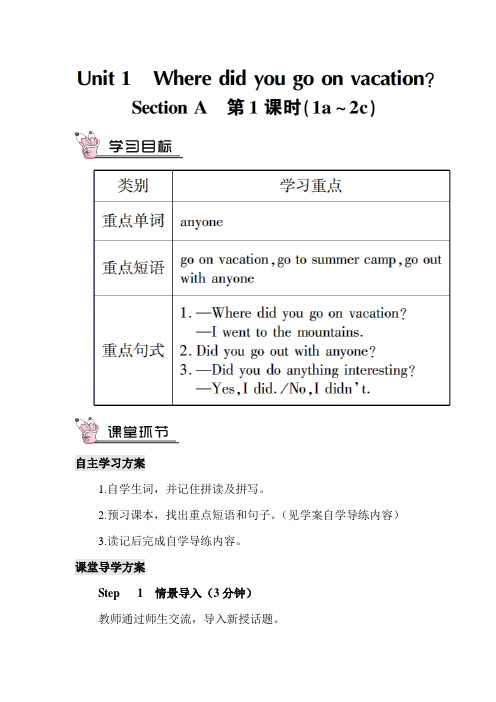
自主学习方案1.自学生词,并记住拼读及拼写。
2.预习课本,找出重点短语和句子。
(见学案自学导练内容)3.读记后完成自学导练内容。
课堂导学方案Step 1 情景导入(3分钟)教师通过师生交流,导入新授话题。
T:What did you do last Friday?S: I went hiking.T: Where did you go on vacation?S: I went to the mountains.(beach, camp, skate, swim)环节说明:以学生假期旅行为话题进行会话开始本节课的教学,引起学生的学习兴趣和用英语表达的欲望。
Step 2 完成教材1a—1c1.教师领读1a中的单词和词组,学生识记单词和词组且将活动和图片中的人物匹配。
(3分钟)2.看1a中的图,听录音,完成1a、1b的听力任务。
(3分钟)3.听录音,跟读。
(2分钟)4.结对练习1c中的对话,然后让2~3对学生表演,并用1a和1b 的信息编练对话。
(6分钟)参考案例A: Where did Tim go on vacation?B:He went to the beaches.5.小结训练。
(1分钟)( A )—What _________ you _________last night?—I watched TV.A. did;doB.do;doC. did;doingD. are;do环节说明:听说结合,第一时间向学生传达语言目标,通过结对对话练习和小结训练,使语言目标得以强化。
Step 3 完成教材2a—2c的任务1.听录音,在2a相对应的方框中写上Grace, Kevin和Julie度假的地方,集体核对答案。
(3分钟)2.听录音,完成2b任务,集体核对答案。
(3分钟)3.跟着录音机朗读听力材料。
(3分钟)4.让学生利用2b中的信息仿照2c的形式练习,并要多组学生表演。
(4分钟)5.小结训练。
(3分钟)( B )(1)I didn’t go out with _________yesterday.A. someoneB. anyoneC. anythingD. anywhere( D )(2)—Did you go to the zoo?—_________.A. Yes, I didn’tB. Yes, I doC. No, I didD. Yes, I did( A )(3)I often went out _________my mother.A. withB.atC. inD. on环节说明:通过听、说、读、写训练让学生掌握一般过去时态的一般疑问句及部分不定代词,使学生的口语表达能力在这一环节中得到提升。
人教新目标八年级上册英语《Unit 1 Where did you go on vacation?》

人教新目标八年级上册英语《Unit 1 Where did you go on vacation?》Section B_教学设计1一. 教材分析人教新目标八年级上册英语《Unit 1 Where did you go on vacation?》Section B 主要讲述了假期旅行的主题。
通过本节课的学习,学生能够掌握一般过去时的疑问句和回答,以及如何描述过去发生的事情。
教材内容贴近学生的生活,激发学生对旅行的兴趣,提高学生的口头表达能力。
二. 学情分析八年级的学生已经掌握了基本的英语语法知识,具有一般现在时和一般过去时的基础。
在学习本节课之前,学生已经学习了如何用英语描述家庭成员和询问他们的去向。
因此,学生在学习本节课时,能够将已有的知识与新的知识相结合,提高学习效果。
三. 教学目标1.知识目标:–能够听懂、说出一般过去时的疑问句和回答。
–能够用英语描述过去发生的事情。
2.能力目标:–能够与他人用英语交流关于假期旅行的经历。
–能够提高口头表达能力。
3.情感目标:–激发学生对旅行的兴趣,拓宽视野。
–培养学生的团队协作精神。
四. 教学重难点•一般过去时的疑问句和回答。
•如何用英语描述过去发生的事情。
•一般过去时疑问句的构成和用法。
•如何在实际交流中运用一般过去时。
五. 教学方法1.情境教学法:通过设置旅行相关的情境,让学生在实际语境中学习英语。
2.交际法:鼓励学生参与课堂互动,提高学生的口头表达能力。
3.任务型教学法:通过小组合作完成任务,培养学生的团队协作精神。
六. 教学准备1.教学课件:制作与旅行相关的课件,包括图片、视频等。
2.教学道具:准备一些与旅行相关的实物道具,如地图、行李箱等。
3.小组活动准备:划分学习小组,提前分配任务。
七. 教学过程1.导入(5分钟)–教师展示一张旅行图片,引导学生谈论旅行的话题。
–学生分享自己最喜欢的旅行地点和经历。
2.呈现(10分钟)–教师通过课件呈现一般过去时的疑问句和回答。
人教新目标版八年级英语上册Unit1Wheredidyougoonvacation教案1

Unit1Wheredidyougoonvacation一、教材分析Unit1Wheredidyougoonvacation?的核心话题为“Talkingaboutholidays,vacationsandpastevents”,主要描述有关假期等过去的事情,学习和运用一般过去时,使学生学会谈论和交流过去发生的事情,让学生在交际活动中学会如何正确用英语谈论自己及询问他人过去的事情与经历,重在培养学生的语言运用能力、实践能力、合作能力及创新意识。
二、教学目标1.知识目标:1)掌握并能灵活运用本单元出现的重点词汇。
动词及它的过去式:stay(ed),visit(ed),go(went),do(did),is/am(was)2)用“Wheredidyougo...?Didyou...?”询问他人过去的经历。
3)掌握以下句式:(1)—Wheredidsb.go(onvacation)?—Sb.+wentto…(onvacation).(2)—Whatdidsb.do(onvacation)?—Sb.+verb+ed…(onvacation).(3)一般过去时的应用。
2.能力目标:学会谈论发生在过去的事情;能听懂以谈论假期做过的事情和谈论过去的事件及自己的感想为话题的语言材料,并获取相关信息。
能以“Talkingaboutholidaysandvacations”,“Talkingaboutpastevents”为话题与他人进行交流;能利用该话题进行情景对话及角色表演。
3.情感目标:本单元的教学内容与学生的实际生活息息相关,容易激发学生的兴趣,从而乐于运用简单的英语与他人进行交流。
学习活动中学生通过交换对过去发生的事情的描述及看法,从而促进学生之间和师生之间的情感交流,增进友谊。
三、重点和难点1.一般过去时及其应用。
注意:本课难点是动词过去式要加“ed”,而学生在描述过去时时容易遗忘动词的“ed”,在运用不规则动词过去式时容易直接加“ed”.2.运用一般过去时描述自己的假期情况及过去的事情。
人教新目标英语八年级上册 Unit 1 sectionA语法知识点总结

人教新目标英语八年级上册Unit 1 sectionA语法知识点总结Unit 1 Where did you go on vacation?一般过去时态的概念:1.表示过去某时间发生的动作或存在的状态。
2.表示过去经常性习惯性的动作。
一般过去时常用的标志词有:yesterday,the day before yesterday,last week/month/year, just now, …ago,in+过去时间…一.用Be动词的一般过去时(1)肯定句式:主语+ was / were + 其它.(2)否定句式:主语+ wasn’t /weren’t+ 其它.(3)一般疑问句:Was/Were + 主语+ 其它?肯定回答:Yes,主语+ was / were .否定回答:No,主语+ wasn’t /weren’t.(4)特殊疑问词+was/were+主语+其他?肯定句:The air was clean yesterday.否定句:The air wasn't clean yesterday.一般疑问句:Was the air clean yesterday?肯定回答:Yes, it was.否定回答:No, it wasn't.特殊疑问句:How was the air yesterday?二.行为动词(v.)的一般过去时态(1)肯定句式:主语+ v-ed+ 其它.【do , does---did】(2)否定句式:主语+ didn’t + v原形+ 其它. 【did not = didn’t】(3)一般疑问句:Did + 主语+ v原形+ 其它?肯定回答:Yes,主语+did.否定回答:No,主语+did’t.(4)特殊疑问词+did+主语+v.原形+其他?肯定句:I rode a horse last Sunday.否定句:I didn‘t ride a horse last Sunday.一般疑问句:Did you ride a horse last Sunday? 肯定回答:Yes, I did.否定回答:No, I didn't.特殊疑问句:(1)What did you do last Sunday?(2)When did you ride a horse?三、动词过去式的构成1. 规则动词的过去式1) 一般情况下,在动词原形后面加-ed。
人教版新目标初中英语八年级上册Unit1知识点汇总
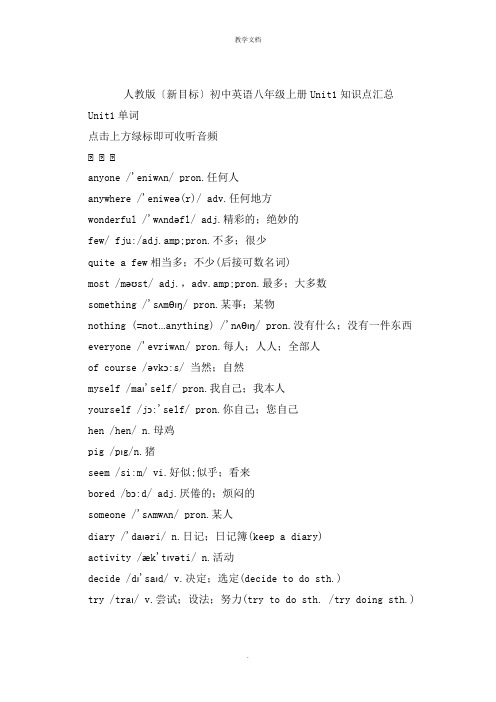
人教版〔新目标〕初中英语八年级上册Unit1知识点汇总Unit1单词点击上方绿标即可收听音频◆◆◆anyone /'eniwʌn/ pron.任何人anywhere /'eniweə(r)/ adv.任何地方wonderful /'wʌndəfl/ adj.精彩的;绝妙的few/ fju:/adj.amp;pron.不多;很少quite a few相当多;不少(后接可数名词)most /məʊst/ adj.,adv.amp;pron.最多;大多数something /'sʌmθɪŋ/ pron.某事;某物nothing (=not…anything) /'nʌθɪŋ/ pron.没有什么;没有一件东西everyone /'evriwʌn/ pron.每人;人人;全部人of course /əvkɔ:s/ 当然;自然myself /maɪ'self/ pron.我自己;我本人yourself /jɔ:'self/ pron.你自己;您自己hen /hen/ n.母鸡pig /pɪg/n.猪seem /si:m/ vi.好似;似乎;看来bored /bɔ:d/ adj.厌倦的;烦闷的someone /'sʌmwʌn/ pron.某人diary /'daɪəri/ n.日记;日记簿(keep a diary)activity /æk'tɪvəti/ n.活动decide /dɪ'saɪd/ v.决定;选定(decide to do sth.)try /traɪ/ v.尝试;设法;努力(try to do sth. /try doing sth.)paragliding /'pærəɡlaɪdɪŋ/ n.空中滑翔跳伞feel like 给……的感觉;感受到bird /bɜ:d/ n.鸟bicycle /'baɪsɪkl/ n.自行车;脚踏车building /'bɪldɪŋ/ n.建筑物;房子trader /'treɪdə(r)/ n.商人wonder /'wʌndə(r)/ v.想了解;琢磨difference /'dɪfrəns/ n.差异;差异top /tɒp/ n.顶部;外表wait /weɪt/ v.等待;等候(wait for)umbrella /ʌm'brelə/ n.伞;雨伞wet /wet/ adj.湿的;雨天的because of因为below /bɪ'ləʊ/ prep.amp;adv.在……下面;到……下面enough /ɪ'nʌf/ adj.足够的(地)adv.充分的〔地〕;充分的〔地〕hungry /'hʌŋɡri/ adj.饥饿的as /əz/ conj.像……一样;如同hill /hɪl/ n.小山;山丘duck /dʌk/ n.鸭dislike /dɪs'laɪk/v.amp;n.不喜欢〔的事物〕;厌恶〔的事物〕Central Park 中央公园〔美国纽约〕HuangguoshuWarterfall /'wɔ:tə(r)fɔ:l/ 黄果树瀑布(贵州) HongKong /,hɒŋ'kɒŋ/,/'ha:ŋ,ka:ŋ/香港〔X特别行政区〕Malaysia /mə'leɪʒə/马来西亚;Malaysian /mə'leɪʒn/adj.马来西亚的;n.马来西亚人;Georgetown /ˈdʒɔ:dʒtaʊn/乔治市〔马来西亚〕Weld /weld/ Quay /ki:/ 海墘街Penang /pɪˈnæŋ/ Hill 槟城山〔马来西亚〕Tian'anmen Square /skweə/,/skwer/天安门广场the Palace /ˈpæləs/ Museum 故宫博物院Mark /mɑr)k/马克〔男名〕02Unit1知识梳理Unit1. Where did you go on vacation(重点短语)1. go on vacation 去度假2. stay at home 呆在家3. go to the mountains 上山/进山4. go to the beach 到海边去5. visit museums 参观博物馆6. go to the summer camp 去夏令营7. quite a few 相当多8. study for为……学习,9. go out 出去10. most of the time 大局部时间/绝大多数时间11. taste good 尝起来味道好12. have a good time 玩的开心13. of course 当然可以14. feel like 感觉像……/想要15. go shopping 去购物16. in the past 在过去17. walk around 绕……走18. too many 太多〔可数名词前面〕19. because of 因为20. one bowl of 一碗……21. find out 查出来/发觉22. go on 继续23. take photos 照相24. something important 重要的事情25. up and down 上上下下26. come up 出来(重点句型)1. —Where did you go on vacation 你到哪里去度假了?—I went to New York City. 我去了纽约城。
人教新目标版英语八上Unit 1《Where did you go on vacation》精美教案

人教新目标版英语八上Unit 1《Where did you go on vacation》精美教案一. 教材分析本课选自人教新目标版英语八年级上册Unit 1《Where did you go on vacation》。
本课的主题是询问假期去向,通过描述假期的旅行经历,让学生运用一般过去时谈论过去的事情。
本课的主要语言点是一般过去时的疑问句和回答,以及表示过去某时刻正在进行的句子。
本课的内容与学生的生活实际紧密相连,能够激发学生的学习兴趣和积极性。
二. 学情分析八年级的学生已经掌握了基本的英语语法知识,对于一般过去时已经有了初步的了解。
但是,学生在运用一般过去时进行交际时还存在一定的困难,需要在教师的引导下进行进一步的练习和巩固。
同时,学生的词汇量和阅读量还需要进一步的扩大,以便能够更好地理解和运用本课的内容。
三. 教学目标1.能够正确使用一般过去时进行疑问句和回答。
2.能够描述过去某时刻正在发生的事情。
3.通过描述假期的旅行经历,激发学生对旅行的兴趣和热爱。
四. 教学重难点1.一般过去时的疑问句和回答。
2.表示过去某时刻正在进行的句子。
五. 教学方法1.情境教学法:通过设置情境,让学生在真实的语境中学习和使用英语。
2.交际教学法:通过小组讨论和角色扮演等方式,让学生在实际交际中运用英语。
3.任务型教学法:通过完成具体的任务,让学生在实践中学习和运用英语。
六. 教学准备1.教学PPT:包括本课的课文内容、图片、视频等。
2.教学卡片:用于操练和巩固所学内容。
3.教学挂图:用于展示和引导学生思考。
七. 教学过程1.导入(5分钟)通过向学生展示一些美丽的旅游图片,引导学生谈论他们假期去过的有趣地方。
同时,教师可以询问学生:“Where did you go on vacation?”,让学生用中文回答,从而引出本课的主题。
2.呈现(10分钟)教师通过PPT展示本课的课文内容,同时用中文解释关键词汇和短语,如“go on vacation”、“go to”、“visit”等。
- 1、下载文档前请自行甄别文档内容的完整性,平台不提供额外的编辑、内容补充、找答案等附加服务。
- 2、"仅部分预览"的文档,不可在线预览部分如存在完整性等问题,可反馈申请退款(可完整预览的文档不适用该条件!)。
- 3、如文档侵犯您的权益,请联系客服反馈,我们会尽快为您处理(人工客服工作时间:9:00-18:30)。
Did you see Huangguoshu Waterfall?
黄果树瀑布
2d Role-play the conversation.
Where did you go on vacation?
went to New York City
Where did you go on vacation?
went to the beach
Where did you go on vacation?
visited my uncle
Where did you go on vacation?
clean play
cleaned
played
stay watch
stayed watched practiced did was
visit
study
visited
studied had went
practice
do
have
go
am / is
Listen and number the people in the 1b picture [1-5].
Unit 1
Where did you go on vacation?
Section A Period 1 (1a-2d)
Where did you go on vacation?
went to the mountains
Where did you go on vacation?
stayed at home
✔
✔ ✔ ✔ ✔
✔
Talk about your vacation plans with your friends and fill in the chart.
Name Vacation plans Who? When?
I decided to go to … David went there last summer vacation. The weather there was … The food … I think it was … So I want to go there next vacation.
Where did you go on vacation?I went to the mountai ns.
2
1 5 3
4
1. Tina 2. Xiang Hua 3. Sally 4. Bob 5. Tom
1c
A: What did Tina go on vacation?
B: She went to the mountains.
Did you … Yes, I did. No, I didn’t.
go with anyone? Grace go to Central Park? buy anything special?
✔
✔ ✔
play volleyball? Kevin swim? meet anyone interesting? do anything Julie interesting? study for tests? go out with anyone?
People
Grace Kevin Julie
Places
New York City (Central Park) the beach stayed at home
2b Listen again. Check (✔) Yes, I did or No, I didn’t for each question.
1
1. stayed at home _____ f b 2. went to New York City ______ g 3. visited my uncle ____ 4. went to summer camp _____ d 5. went to the mountains _____ c 6. went to the beach ______ a 7. visited museums ______ e
visited museums
Where did you go on vacation?
went to summer camp
1a Match the activities with the pictures [a-g].
Where did you go on vacation?
பைடு நூலகம்
I went to the mountains.
A: Where did … go on vacation?
B: ...
went to the beach
A: Where did … go on vacation? B: ...
stayed at home
2a Listen. Where did the people go on vacation? Complete the chart.
2c Role-play conversations between Grace, Kevin and Julie.
A: Grace, where did you go on vacation? B: I went to New York City. A: Oh, really? Did you go with anyone? B: Yes, I went with my mother.
